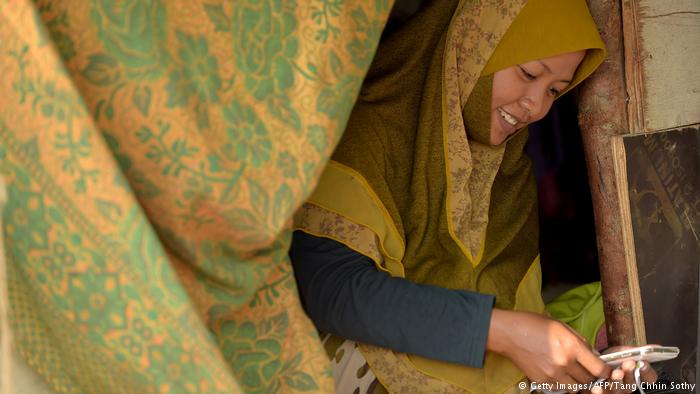Cambodia: Who runs the world? Not women!

A Cambodian-Muslim woman checks her smartphone at her shelter along the Mekong river in Phnom Penh on February 21, 2018.
“This is a man’s, man’s, man’s world,” James Brown crooned in 1966. And though Beyonce in 2011 announced in a song that “girls” run the world, this is not the case at all. James Brown’s statement holds true over 50 years later. Worldwide, the number of women in government and other positions of power remains low. How can “girls” run the world when generally men are at the steering wheel?
Cambodia is no exception. Centuries have passed since it was a matriarchal society. Men make decisions in government, in court, in business, making decisions on behalf of women too.
Immediately after the communal elections of 2017, Committee for Participation of Women in Politics (CPWP) released a statement pointing out that of 11,572 elected representatives only 1,940 were women.
That figure was actually lower than the result after the previous elections, where 2,038 women had been elected to commune councils. Of 1,646 communes, 344 have no female representative at all.
The situation has not improved considerably since the dissolution of the main opposition party in November 2017. The number of women in the country’s commune councils has risen, if only to 2,323 but only 19 women are members of parliament whereas there were 25 before. Women make up only 15 percent of parliament. The Senate is no better: Only 8 of 25 senators are women.
Reasey Seng, a project coordinator at the women’s NGO SILAKA is concerned about the situation: “If women cannot fully participate, then they cannot exercise their rights.”
“Policy and law will not benefit everyone due to the few women at decision-making level and women’s voices re not being heard or counted, from grassroots to the decision-making level.”
She said that women and marginalized groups would be left behind if there was no urgent change.
I would agree with her that the idea of letting men make decisions about what’s best for women is ludicrous. Lack of representation is a serious issue.
Looking back on it, Seng pinpointed the cause to patriarchy. She said it influences the culture and norm in the country, as well as re-enforce the political system.
Seng blames the patriarchal nature of Cambodian society and dangerous stereotypes. There is an idea that “women are not meant to be leaders and politicians. A woman’s role is in the house. She should make babies and take care of the family.” She added, “There is prejudice against women who are considered too emotional, not as strong.”
Little girls should be able to grow up and aspire to be leaders if they wants and choose to be. But they have very few female role models to look up to in global politics so they might be discouraged.
Unless we have equal representation in government and parliament, women will not be able to achieve their rights.
Author: Catherine V. Harry (act)





